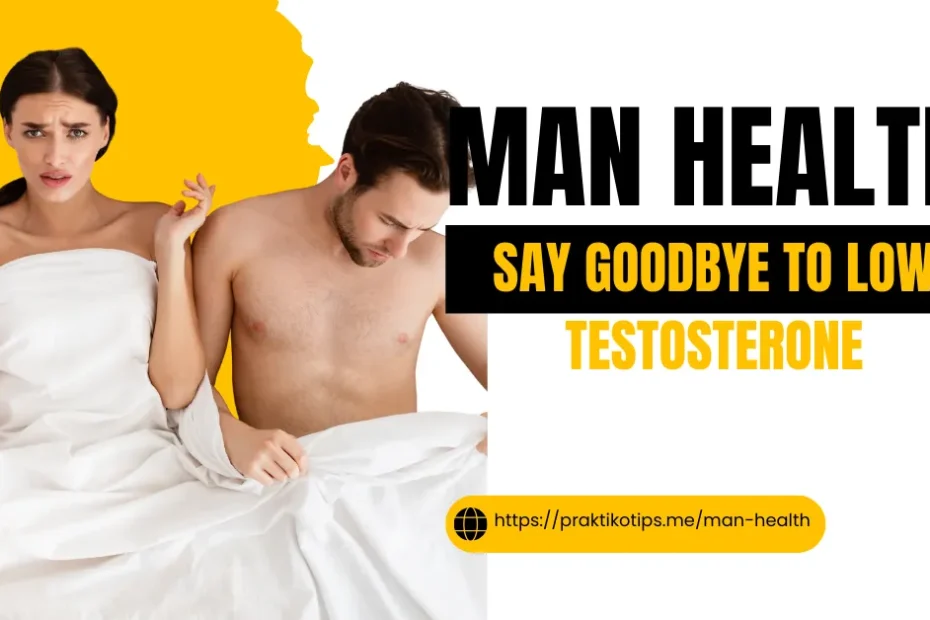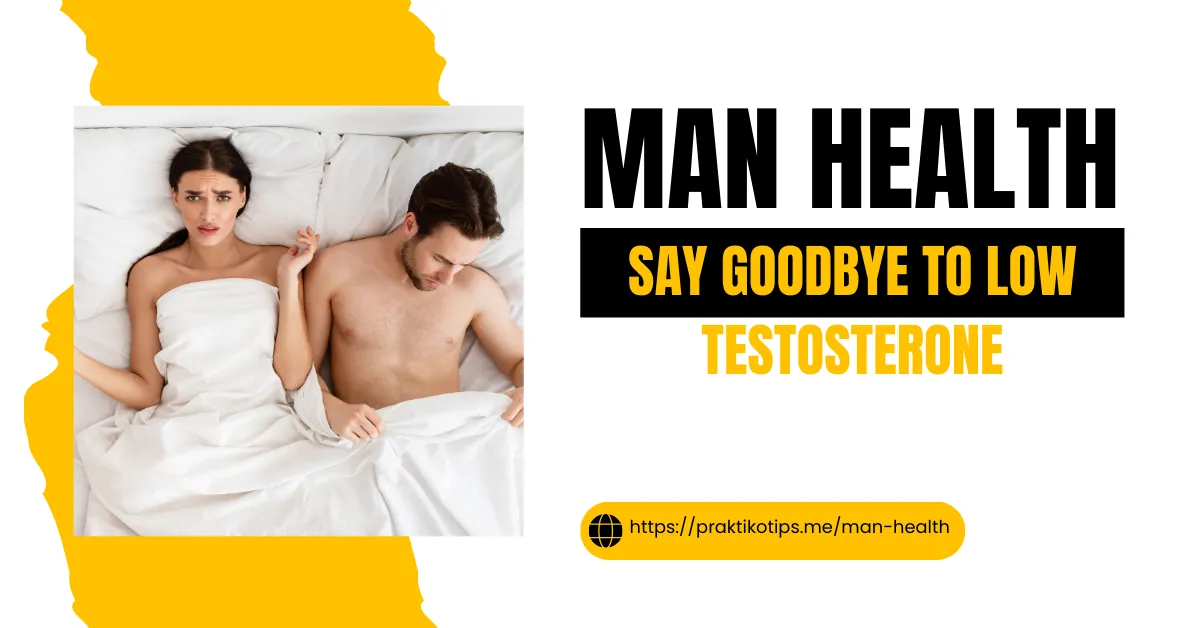Testosterone is a hormone that plays a crucial role in men’s health. It helps maintain sexual desire, muscle mass, bone density, mood, libido, and overall health. However, low testosterone levels in men can cause a host of problems, including low sex drive, erectile dysfunction, decreased muscle mass, fatigue, depression, and poor sleep quality.
Additionally, low testosterone levels may lead to osteoporosis, diabetes, and heart disease.
Boost Your Vitality: Reclaim Energy, Strength & Confidence
Effects of Low Testosterone in Men
Causes of Muscle Loss (Sarcopenia)
Muscle tissue depends on special cells called myocytes, which get their energy from tiny “power plants” inside the cells called mitochondria. These mitochondria produce ATP, the fuel your muscles need to contract and stay strong.
As men get older, testosterone levels naturally decline. Lower testosterone levels mean the body produces fewer mitochondria, which in turn reduces ATP. With less energy available, muscles cannot contract as effectively, leading to a gradual loss of muscle size, strength, and function.
Over time, this process contributes to a condition called sarcopenia, also known as age-related muscle loss. Sarcopenia makes everyday tasks harder, increases the risk of falls, and reduces overall quality of life if not managed with proper exercise, nutrition, and healthy habits.
Increases Fat Storage
Due to differences in hormone levels, men tend to store more fat than women. When testosterone levels drop, the body begins storing fat instead of burning it, leading to increased abdominal fat storage, particularly around the waistline. Fat stored in the abdomen is metabolically active, producing harmful substances that contribute to inflammation and insulin resistance.
Bone Health and Testosterone
Testosterone plays a crucial role in maintaining bone strength. When testosterone levels drop, men are more likely to lose bone density, which can lead to osteoporosis. Osteoporosis causes bones to become weak and brittle, thereby increasing the risk of fractures.
Bone loss occurs gradually over time, typically beginning in middle age. Around age 50, men’s testosterone levels start to decline more noticeably, and bone loss speeds up with each decade. By age 70, men are about twice as likely to develop osteoporosis compared to younger men.
Sleep Quality and Testosterone
Sleep and testosterone are closely connected. Poor sleep can disrupt the body’s natural rhythm, known as the circadian rhythm, which regulates hormone levels and other bodily functions. When this rhythm is disturbed, testosterone production can drop—leading to even worse sleep quality.
This creates a cycle: low testosterone makes sleep more complicated, and poor sleep further lowers testosterone, affecting energy, mood, and overall health.
May Lead to Depression
Depression is common among older men, and studies show that men with low testosterone levels are more likely to suffer from depression. Depressed older people had significantly lower total testosterone levels than non-depressed men, as found in a study published in the Journal of Clinical Endocrinology & Metabolism. Researchers believe that low testosterone levels may play a role in the development of depression.
Diabetes and Testosterone Connection
Type 2 diabetes happens when the pancreas doesn’t make enough insulin—the hormone that helps your body turn sugar (glucose) into energy. Without enough insulin, blood sugar levels rise and can damage blood vessels and nerves. Over time, this can lead to serious problems like kidney disease or nerve damage.
Research also shows a strong link between diabetes and hormone health. Men with type 2 diabetes are more likely to have lower testosterone levels compared to men without diabetes. This means diabetes doesn’t just affect blood sugar—it can also impact energy, mood, muscle strength, and overall well-being.
Can Increase Inflammation
Inflammation is triggered by the immune system’s response to foreign invaders, and chronic inflammation contributes to the development of diseases such as arthritis and atherosclerosis. Research shows that people with higher levels of inflammatory markers are more likely to experience low testosterone levels.
Say Goodbye To Low Testosterone With These Tips
Are you ready to take back your energy, strength, and confidence? With the right lifestyle adjustments, you can say goodbye to low testosterone and enjoy a healthier, more vibrant life. Understanding how low testosterone levels for men affect overall health is the first step toward improving hormonal balance.
Lifestyle Habits for Better Prostate & Hormone Health
- Exercise Regularly: Improves circulation, reduces inflammation, and supports healthy hormone levels.
- Maintain a Healthy Weight: Excess body weight raises the risk of prostate problems and contributes to low testosterone levels for men.
- Limit Alcohol: Excessive alcohol intake is linked to prostate cancer and hormone imbalance.
- Quit Smoking: Smoking increases the risk of prostate disease and negatively affects testosterone.
- Stay Hydrated: Adequate water intake supports urinary and prostate health.
- Good Hygiene: Reduces infection risks that can impact both prostate and hormone balance.
- Prostate Screenings: Early detection can save lives and ensure long-term vitality.
Foods to Avoid for Optimal Testosterone Levels
Maintaining optimal testosterone levels is vital for overall well-being. Certain dietary choices can interfere with hormone production. Here are key foods to limit or avoid:
- Excessive Sugar: Raises insulin and suppresses testosterone. Avoid sodas, desserts, and processed snacks.
- Excessive Caffeine: Too much coffee or energy drinks increase cortisol, lowering testosterone.
- Red Meat & Animal Fats: High in saturated fats, which may impair hormone balance. Choose lean proteins instead.
- Dairy Products: Certain dairy may contain hormones that interfere with natural testosterone production.
- Artificial Dyes & Additives: Processed foods with dyes can disrupt the endocrine system.
- Processed Foods: High in unhealthy fats and sugars, which can worsen low testosterone levels in men.
A healthy lifestyle with balanced nutrition, regular physical activity, hydration, and preventive screenings is the best way to combat low testosterone levels in men. Remember: small daily changes add up to long-term vitality, energy, and confidence. Always consult your doctor if you have concerns about hormone or prostate health.
Natural Ways To Boost Testosterone Levels In Men
The American Cancer Society reports that prostate cancer is the most common cancer among males, affecting one in eight males in the United States. However, adding healthy, prostate-friendly foods to your diet can help reduce your risk of prostate problems, including prostate cancer. Here are six foods to consider adding to your diet:
Tomatoes contain lycopene, a powerful antioxidant that may help reduce the risk of prostate cancer by decreasing cell damage and slowing the production of cancer cells.
Broccoli: Broccoli contains sulforaphane and other anticancer compounds that selectively target and kill cancer cells. Other cruciferous vegetables include cauliflower, cabbage, Brussels sprouts, and kale.
Green Tea: Green tea contains powerful antioxidants that could help fight cancer. Evidence suggests that unique compounds in green tea may reduce the risk of prostate cancer by influencing tumor growth, cell death, and hormone signaling.
Legumes and Soybeans: Legumes, including soybeans, contain compounds called phytoestrogens, which may help suppress tumor growth. The National Cancer Institute (NCI) has shown a link between the consumption of soy and reduced levels of prostate-specific antigen (PSA), a protein produced by the prostate that measures the level of PSA in the blood and is used as a screening test for prostate cancer.
Pomegranate Juice: Pomegranate juice contains high levels of antioxidants, which may help prevent chronic diseases associated with oxidative stress. The NCI says that pomegranate juice and some of its bioactive components may help inhibit the proliferation of prostate cancer cells.
Fatty Fish: Fatty fish like salmon and mackerel contain healthful omega-3 fatty acids that may help keep the prostate healthy. However, more research is needed to establish a direct link between higher omega-3 fat consumption and a lower risk of prostate cancer.
Low Testosterone Levels: Not Just a Men’s Issue!
Did you know that low testosterone levels don’t just affect men? While the topic is most often associated with low testosterone levels for men, women also produce this hormone, just in smaller amounts. When levels fall below normal, both men and women can experience symptoms that disrupt daily life and overall well-being.
For men, the impact can be significant. Low testosterone levels in men often lead to fatigue, reduced libido, muscle loss, mood swings, and even difficulty concentrating. These changes can influence physical health, emotional stability, and long-term quality of life.
Women, too, may notice similar symptoms, including decreased energy, weight gain, low sex drive, and depression. In both sexes, these issues aren’t always just a “normal” part of aging—they may point to deeper hormonal imbalances or underlying health concerns.
✨ Recognizing the signs of low testosterone levels for men and women is the first step toward restoring hormonal balance, boosting energy, and improving emotional well-being. If you’ve been feeling “off,” checking your hormone levels could be the key to getting back on track.
Conclusion – Low Testosterone in Men: Why It Matters
Testosterone is one of the most important hormones for men’s health. It helps maintain muscle strength, bone density, energy, mood, and sex drive.
When levels drop, it can cause many problems. Low Testosterone in Men often leads to fatigue, low sex drive, erectile dysfunction, loss of muscle, poor sleep, and even depression. Over time, it can also increase the risk of osteoporosis, diabetes, and heart disease.
The good news is that diet and lifestyle changes can help. Adding healthy, prostate-friendly foods may reduce the risk of prostate problems, including prostate cancer. Foods such as tomatoes, broccoli, green tea, legumes, soybeans, pomegranate juice, and fatty fish like salmon or mackerel are rich in nutrients that support hormone balance and prostate health.
By making smarter choices, men can protect their prostate, boost overall health, and lower the risks linked to Low Testosterone in Men. Regular check-ups, exercise, and a balanced diet are all essential for maintaining hormone balance and naturally combating the effects of Low Testosterone in men.



This article was a wakeup call for me! I never knew how much sleep affected testosterone levels. For those who’ve improved their sleep patterns, did you see a noticeable change in your energy throughout the day?
Thanks for sharing this! Do you think stress management could also play a role in boosting testosterone levels? I’m curious because I’ve noticed my energy dips when I’m more stressed out.
Low testosterone can affect more than just physical health; it can also impact emotional well-being